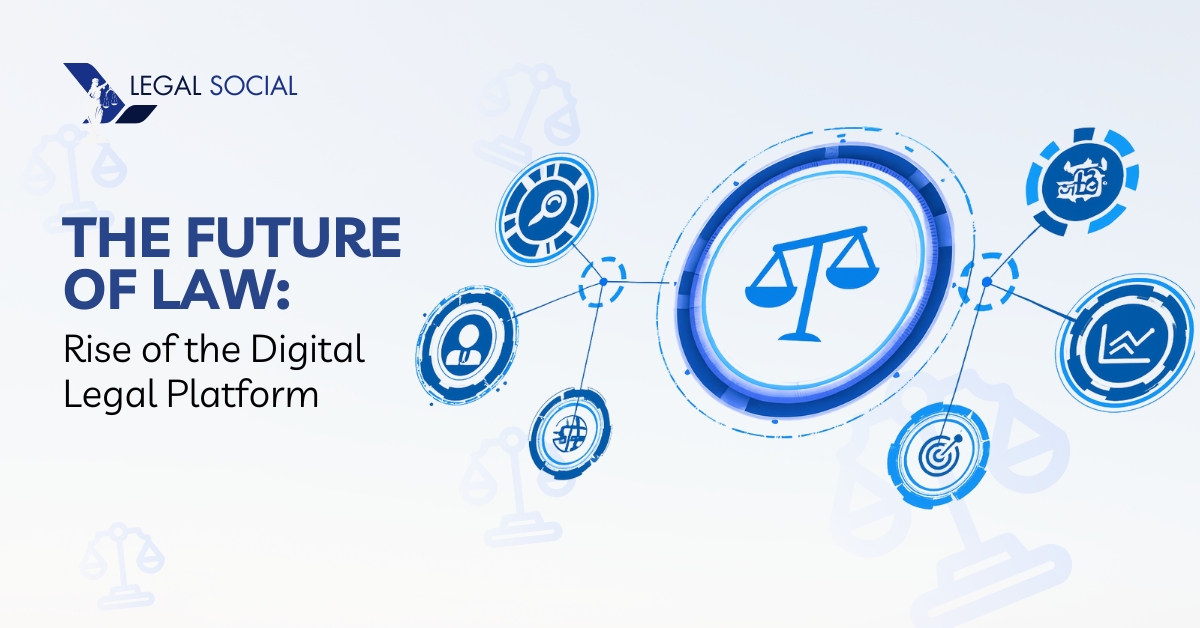Tradition, formality, and paperwork have long defined the legal industry. Yet as technology revolutionizes nearly every aspect of our lives, it must also do so with law. Today, a new strain of innovation is transforming legal services as we now know it: the digital legal platform. Digital legal platforms are helping to improve efficiency, access to legal services and expertise, and transparency across the legal services continuum from workflows to legal support.
What does the current landscape and future of legal services look for lawyers, businesses, and individuals in a digital-first legal world? Let’s take a closer look.
The Shift from Tradition to Digital Innovation
For many years, legal proceedings involved enormous piles of paper, long meetings, and difficult processes that were intimidating for clients. Law firms itself survived off legacy systems, networks of contacts, and meetings in person. But now that the world has moved on to digital in their expectations for service delivery, just like they expect their banking, shopping, and medical care to be online, clients now expect their lawyers and legal services to provide similar respone to access to legal services.
Digital legal platform represents the best of legal services, tools and technologies that can be used in one unified ecosystem. Legal services that used to take place sporadically in an office are now consumable online, no matter what it is we are doing whether it’s drafting a contract, filing a case, or seeking legal advice it’s all now done online. Whenever you combine cloud computing, artificial intelligence, and blockchain, you’re driving population acceptance that comes with security, accuracy, and speed.
What Exactly is a Digital Legal Platform?
At the essence, a digital legal platform is a seamless system that provides legal services via technology. It’s like having a single source of truth for anything legal: document automation, compliance, e-discovery, case tracking, and even lawyer-client collaboration. Digital legal platforms view law as a service; rather than focusing on simply billing for the time the lawyer is working, they work to automate things the lawyer would otherwise have to do manually and provide on-demand access to legal materials. In contrast, a traditional law firm would require a human to do that work as a necessary step to provide legal services to a client.
Some digital legal platforms are designed for individuals who may want to put a will, rental agreement, or business contract in place without hiring a lawyer for basic services. Others are intended for enterprises, and give a chance for management of compliance, legal risk, intellectual property management or dispute resolution. For lawyers, they are an “assistant”, to save time, risk mistakes and allow the lawyer to think strategically instead of repeating administrative-type work.
Key Features Transforming Legal Services
The value of a digital legal platform is in the distinct offerings that impact how legal services are delivered and engaged. Some of the most impactful are:
- Document Automation – Writing legal documents manually is a slow and imprecise task. But with document automation, users can produce standard contracts, agreements and policies in minutes without mistakes.
- AI-Powered Research – Artificial Intelligence tools can analyze thousands of cases, judgments and statutes in seconds. AI can transform legal research work, ensuring lawyers conveniently have relevant information at their fingertips.
- Virtual Consultations – Rather than getting in the car, clients can speak to their lawyers via secure video calls, saving clients time and money it’s often really valuable expenditure.
- Case and Workload Management – Digital legal platforms provide lawyers with tools to track their cases, deadlines and more. Clients can also login and monitor the progress of their cases (very good for transparency).
- Compliance Monitoring – Businesses operate within a complex regulatory environment. Digital legal platforms can monitor compliance obligations in real time and send alerts when regulatory deadlines are arising or rules have changed.
- Blockchain – Legal documents and contracts often contain confidential information. Blockchain can capture the records and make them immutable and tamper-proof.
The Benefits of Embracing Digital Legal Platforms
The adoption of digital legal platforms offers wide-ranging benefits for both professionals and clients.
- Efficiency and Speed: Repetitive manual work is reduced, freeing up valuable time for lawyers to focus on higher-value tasks.
- Cost Savings: Automation and self-service tools allow individuals and small businesses to access legal services at a fraction of traditional costs.
- Accessibility: People in remote areas who may have previously struggled to find legal help can now connect with lawyers online.
- Transparency: Clients can monitor the progress of their cases and stay updated without repeated phone calls or office visits.
- Scalability: For law firms, digital platforms make it easier to manage more clients and expand their reach without increasing overhead costs.
How Lawyers and Firms are Responding
Although some legal professionals were cautiously awaiting the adoption of digital, the tide appears to have turned. Many legal firms that see the future know that a digital legal platform is not a competitor, but a facilitator providing options for lawyers to improve efficiencies for client work, and offer better services, and improve profit in a global marketplace.
Solo practitioners are likely the group’s seeing the best impact from these changes with affordable digital tools giving them the ability to compete with their counterparts at large firms with lower fees due to efficiencies derived from the use of digital tools. Clients, therefore, discover that they receive personalized legal advice, which is swift, and delivered in a convenient and desirable format digitally.
The Role of Artificial Intelligence
Artificial Intelligence, AI, is one of the most exciting developments in the evolution of the digital legal platform. AI-powered tools are becoming essential tools at the early stages, from research or document review, to evaluating predictive models. For example, AI can analyze previous cases to predict the likely outcome of a lawsuit, taking in all of the relevant legal frameworks. While human reasoning and judgment will always be necessary as part of legal strategy, AI adds an extra layer of insight that helps lawyers make better data-driven decisions.
AI-Powered chatbots are also becoming a more important development. Chatbots can assist clients with simple questions, guide users through basic processes, or even help draft simple documents. This way, lawyers can spend their attention on more complex/high-stakes engagements while their clients still have instant support.
Challenges Ahead
Caveats aside, it is evident there is still work to do in terms of the resignation and legitimisation of digital legal platforms into broader usage. Data privacy is a concern, primarily because legal data is likely to be quite sensitive compared to other forms of data. Accordingly, legal platforms require strict adherence to high security standards.
There is also the issue of digital literacy. Younger generations learning about legal services online might find the transition seamless, whereas older clients do not see it easy transferring from traditional face-to-face interactions. Managing this transition onto digital platforms is essential and ensuring a compatibility between convenience and personalisation.
Finally, there is apprehension that technology may replace lawyers. The reality is that the role of lawyer is changing and not disappearing. Legal digital platforms should not be viewed as a technology that replaces human skills, but rather as a collaborator that amplifies human skills.
The Road Ahead
The future of law will be shaped by how quickly and effectively the industry embraces digital transformation. In the coming years, we are likely to see:
- Greater integration of AI for predictive analytics and contract review
- Widespread adoption of blockchain for secure transactions and record-keeping
- Platforms designed specifically for niche legal sectors such as intellectual property or cross-border trade
- A rise in self-service legal platforms that empower individuals and small businesses
- Governments and courts are integrating digital systems to streamline judicial processes
The end result will be a legal system that is faster, more transparent, and more accessible to all.
Conclusion
The emergence of the digital legal platform represents not just a technological shift but a cultural one. The digital legal platform represents a move to accessible, efficient, client-centered service in a sector that has been questioned for complexity and opacity for a long time.
While there are some barriers to entry, there are far more potential benefits than obligations.
To attorneys digital platforms mean relevance and competitiveness. To businesses it means compliance and the ability to resolve disputes faster. To individuals it means they can obtain access to justice and peace of mind affordably.
The future of law is digital, and at this intersection of culture and technology lies the future digital legal platform. Those who embrace it now, will shape the future of the profession and pave the way for a more transparent and equitable legal system for society as a whole.










